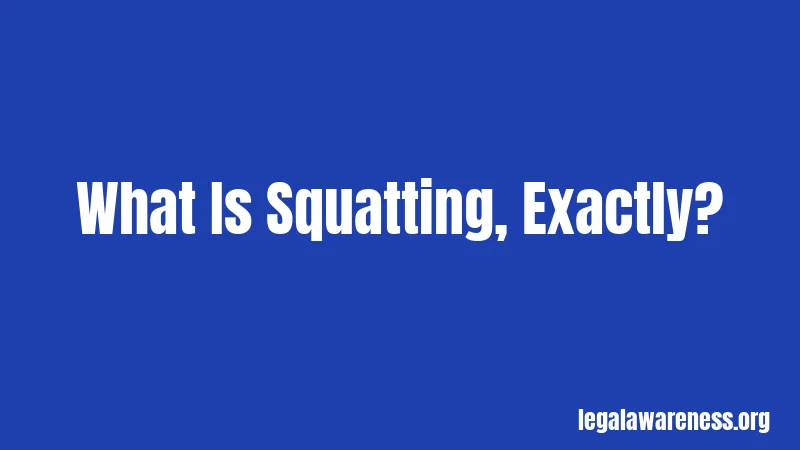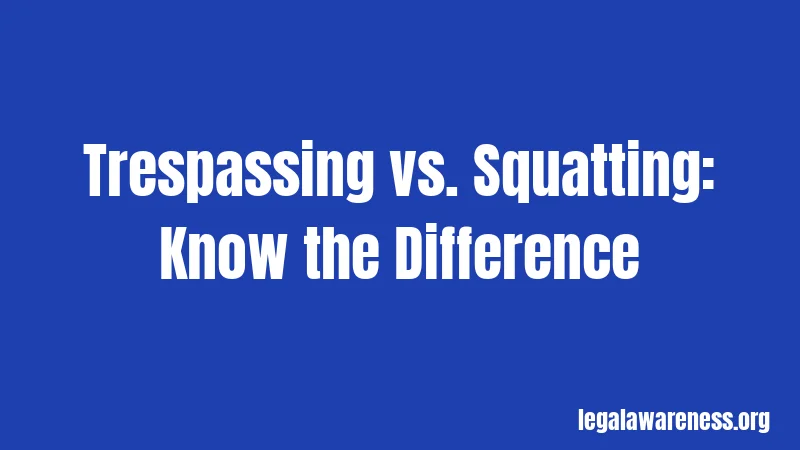Squatter Laws in Texas (2026): What Property Owners Must Know
You have a property. You’re paying taxes on it. And then you find out someone’s living in it without permission. Pretty shocking, right?
This happens more often than people realize. In Texas, squatters have certain legal rights that might surprise you. But don’t worry, you’re not helpless. The state has clear rules about what you can and can’t do.
What Is Squatting, Exactly?

Okay, let me break this down. Squatting is when someone occupies a property without the owner’s permission. They’re not paying rent. They’re not on the lease. They’re just… living there.
This might sound simple, but there’s a lot more to it legally. A squatter isn’t the same as a trespasser. That difference matters big time. Honest, this is the part most people miss.
A trespasser breaks in and leaves. A squatter stays long-term and might even claim they have rights to the property. In Texas, staying on property long enough can give someone legal claims you’ll need to address properly.
Basic Squatter Laws in Texas
What Qualifies as Squatting in Texas?
In Texas, squatting becomes a legal issue when someone occupies property without permission and stays there long enough. Not sure what counts as long enough? Here’s what matters.
After occupying a property for a certain time, squatters might try to claim what’s called adverse possession. This is where it gets serious. Adverse possession means they’re arguing the land is actually theirs now because they’ve been there so long.
Think of it like trespassing, but with extra consequences and potential legal complications. The person isn’t just breaking in and leaving. They’re living there openly and continuously.
Adverse Possession Rules in Texas
Hold on, this part is important. Adverse possession is how squatters can actually take ownership of your property in Texas. Yes, you read that right.
For this to happen, the squatter must occupy your land for at least 10 years. But here’s the catch: they need to meet some specific requirements. The occupation has to be open, obvious, and continuous. They can’t hide it. They can’t take breaks and come back later.
Texas courts look at whether the squatter paid property taxes on the land. If they paid taxes for 5 years, the time period drops to just 5 years instead of 10. Let me repeat that because it’s crucial: paid taxes, 5 years. No taxes, 10 years.
The squatter also needs to have an honest belief they own the property. That belief has to come from something, like a faulty deed or a misunderstanding about a property line. They can’t just camp out and claim ownership without some reason to think it’s theirs.
What Counts as “Open and Notorious”?
Wondering if someone’s occupation counts as open? It means everyone can see it. The squatter isn’t hiding. Neighbors know someone lives there. You should be able to see obvious signs of occupancy.
This is why the land owner’s job is tricky. If you see signs someone’s on your property, you need to act. Ignoring it for too long could mean you lose your claim to the land.
Trespassing vs. Squatting: Know the Difference

Here’s where it gets interesting. Trespassing and squatting are different crimes in Texas, and that matters for how you respond.
Trespassing is simpler. Someone enters your property without permission. They have no claim to owning it. You can call police immediately. They’ll remove the person faster.
Squatting is when someone claims they might own the property or have a right to be there. This makes legal removal much harder. You can’t just call police and have them removed. You need to go through an eviction process.
Most people don’t realize this distinction until they’re stuck in a property dispute. You’re not alone, this confuses a lot of people.
Penalties for Squatting in Texas
If You’re Caught Trespassing
Criminal trespassing in Texas can bring real consequences. If you’re on someone else’s property without permission, you could face a fine up to $500. That’s just the basic fine.
If you damage the property or enter a building, the penalty increases. You could face up to $2,000 in fines and jail time up to 180 days. That’s half a year in jail.
If you refuse to leave after being asked, it’s even worse. You could be charged with criminal trespassing with intent, which carries harsher penalties.
Long-Term Squatting Consequences
Wait, it gets better. If you’ve been occupying property illegally and try to claim ownership, you’re looking at a much bigger problem.
Courts can force you to leave. You lose any claim to the property. You might also face damages if the property owner can show you caused harm.
The property owner can also sue for the value of using the land. This gets expensive fast. You could owe thousands for a year or two of occupation.
How to Protect Your Property in Texas

Document Everything
Here’s the most important advice: keep detailed records of your property. Take photos regularly. Document any signs of occupancy that shouldn’t be there.
Write down dates when you notice someone on your property. Save any communications about the property. Keep tax records and deeds in a safe place.
This documentation is gold in court. Judges want to see you’ve been paying attention to your property. They want to see you didn’t just ignore someone living there for years.
Post “No Trespassing” Signs
You absolutely should post clear signs on your property. These signs give you legal protection in Texas. They show you’re actively protecting your property.
Place signs at entry points. Make sure they’re visible. The signs should clearly state the property is private and trespassers will be prosecuted.
This step is simple. It’s also legally important. Without visible signs, some courts might think you weren’t actively protecting your property.
Regular Inspections and Upkeep
Walk your property regularly. This sounds obvious, but you’d be shocked how many property owners don’t do this. Frequent visits show the land is occupied by you, the owner.
Keep the property maintained. Cut grass, fix fences, clean up debris. This visible maintenance proves you’re actively using and caring for the land.
Think of it like evidence that the property has an owner who cares about it. Squatters find it much harder to claim land when the owner is clearly involved.
Evicting a Squatter in Texas
The Eviction Process
Okay, pause. Read this carefully. If someone’s already on your property and claiming rights, you need a formal eviction.
First, you serve the person a notice to vacate. This gives them a specific amount of time to leave, usually three days in Texas. If they don’t leave, you file for eviction in justice court.
The court will hold a hearing. Both sides get to present their case. The judge decides whether the person has any legal right to be there. Most of the time, they don’t.
If you win, the judge issues a judgment for possession. Law enforcement physically removes the person. This process usually takes several weeks to a few months.
When You Should Hire a Lawyer
Don’t try to handle this yourself if you’re uncertain. Seriously. Hiring a lawyer is worth the money.
If the person claims they have a lease or rental agreement, you need legal help. If they claim ownership or adverse possession rights, definitely get a lawyer.
A lawyer knows Texas law inside and out. They’ll handle paperwork correctly. They’ll protect your rights in court. The cost is usually way less than losing property to a squatter.
Important: Don’t Use Self-Help Eviction
Here’s something critical. Do not try to physically remove the squatter yourself. Don’t change locks while they’re there. Don’t remove their belongings.
Self-help eviction is illegal in Texas. You could face lawsuits. You could be charged with assault or destruction of property. You could lose your case because you broke the law.
Use the court system. Yes, it takes time. But it protects you. Let the sheriff handle the physical removal. That’s their job, not yours.
Special Situations and Exceptions
Tenants with Invalid Leases
Sometimes someone claims they have a lease, but the lease is invalid. Maybe it was never signed properly. Maybe the person renting it wasn’t the actual owner.
You still need to evict them properly. Claiming their lease is invalid doesn’t let you skip the legal process. Courts don’t like shortcuts.
Follow the eviction process even if you think their claim is wrong. Let the judge decide. This protects you legally.
Property Lines and Border Disputes
Border disputes happen more than you’d think. Someone might genuinely believe the land is theirs because of a property line mistake.
If this is the case, you need a surveyor. Get a professional survey of the property lines. Document exactly where your property ends and theirs begins.
With a professional survey, the adverse possession claim becomes much harder for them to win. You’ve proven the real boundaries.
Abandoned Properties
Texas has special rules for truly abandoned property. If land has been completely unused for years, different rules might apply.
But here’s the thing: you still need to act. Posting signs, paying taxes, and maintaining the property are all important.
Don’t assume an old, unused property is safe from squatters. Even abandoned-looking land needs protection.
Recent Changes to Texas Law
2024 and 2025 Updates
Texas has been tightening rules around squatter rights in recent years. The state wants to protect property owners more strongly.
One change makes it harder for squatters to claim adverse possession when property is clearly commercial or industrial land. Courts scrutinize claims more carefully now.
Another change improves the eviction process speed. Texas has worked to make legal removal faster. Some jurisdictions now have faster hearing dates.
These changes favor property owners. But you still need to follow all the rules. Don’t skip steps or try illegal removal tactics.
Property Owner’s Checklist
Stay informed and proactive. Here’s what you should do:
Pay your property taxes every year without fail. File all required documents with the county. Visit your property regularly, at least once a month. Take photos showing maintenance and upkeep.
Keep detailed records of all property-related activity. Post clear “No Trespassing” signs at all entry points. Document any trespassing or unauthorized occupation immediately.
Contact police if you see someone trespassing. Get a police report number. Consider hiring a lawyer if someone claims rights to your property.
Frequently Asked Questions
Can someone really claim ownership of my land by living on it? Yes, through adverse possession, but only if they meet all the legal requirements and stay for 5-10 years depending on whether they pay taxes. You can stop this by taking action early, posting signs, and maintaining your property.
What should I do if I find someone squatting on my property? Document it immediately with photos and dates, contact the police and get a report number, consult a lawyer before taking any action, and never try to physically remove them yourself.
How long does the eviction process take in Texas? Usually several weeks to a couple of months, depending on the court’s schedule and whether the person contests the eviction. Having a lawyer can help speed things up.
Is squatting a criminal or civil matter in Texas? Both. Criminal trespassing brings fines and jail time, while adverse possession is a civil matter handled in court. The type matters for how you respond.
Can I just change the locks if someone’s squatting on my property? No, that’s illegal self-help eviction in Texas. You must use the court system. Changing locks yourself could result in lawsuits against you.
What makes occupancy “open and notorious” for adverse possession? The squatter must be living openly, not hiding, and the occupation must be obvious to neighbors and the community. Complete secrecy doesn’t count.
Final Thoughts
Texas protects property owners, but only if you protect yourself first. Don’t wait and hope the problem goes away. Hope doesn’t stop adverse possession claims.
Stay informed about your property. Stay active with maintenance and inspections. Stay alert for trespassers and squatters.
The good news? Texas law gives you tools to reclaim your property. You just need to use them correctly and quickly. When in doubt, talk to a lawyer. It’s worth the investment to keep what’s yours.
References
Texas Property Code: Adverse Possession (Section 16.021-16.051)
Texas Penal Code: Criminal Trespass (Section 30.05)
Texas Justice Court Training Center: Eviction Process
State Bar of Texas: Find a Lawyer
Texas Property Tax Assessor: County Tax Information
Legal Information Institute: Adverse Possession
